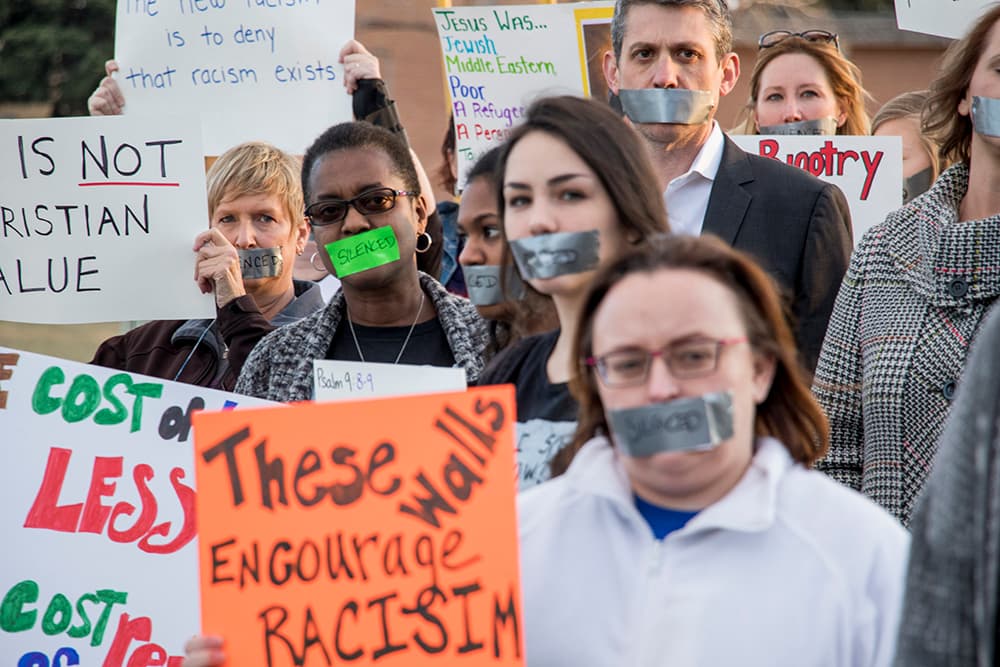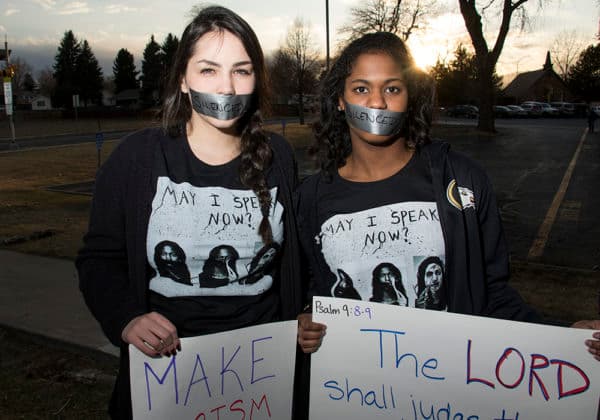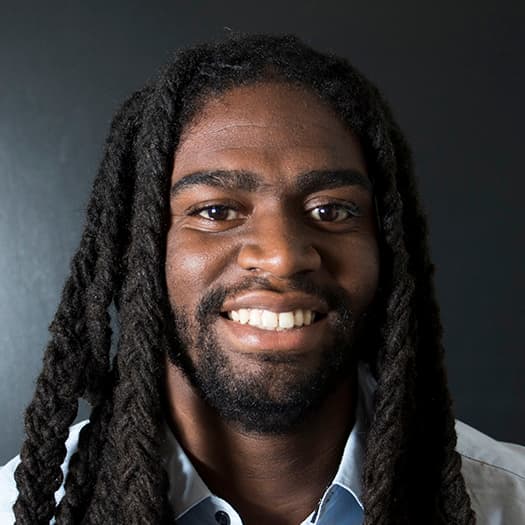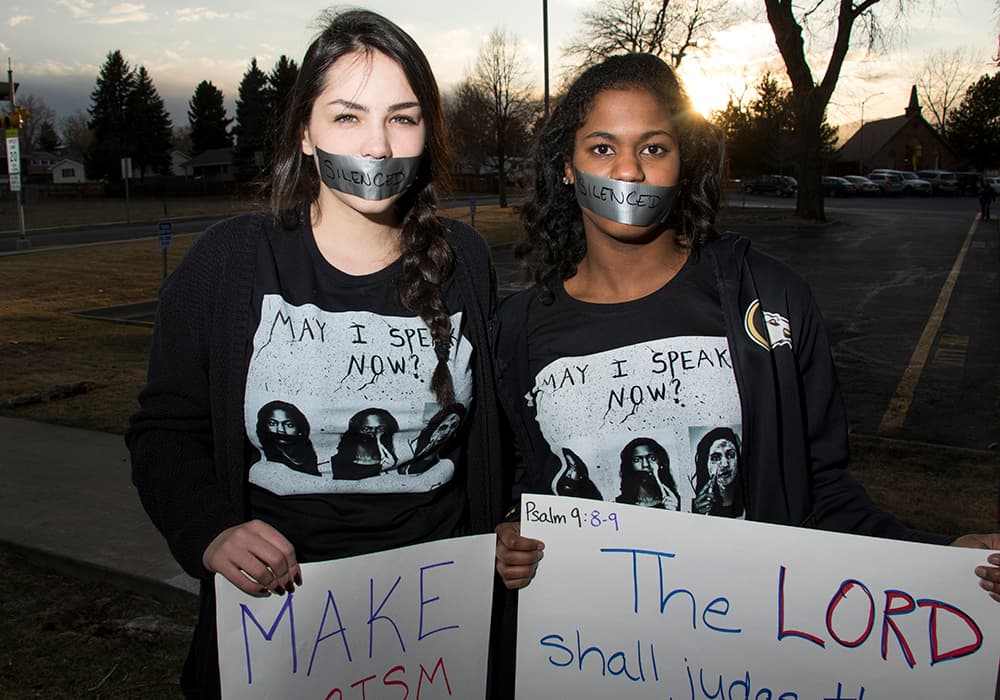
A tumultuous few weeks at Arvada's Faith Christian Academy led the school to organize (and then cancel) a meeting to address concerns after a teacher's firing amid conversations about racism on campus.
Some Faith Christian parents think the conversation at a school event earlier this year on faith and race was out of line, while others think there's still much to discuss. And an expert in this kind of sensitive discussion says the school has gotten itself into a complicated situation that won't result in the black-and-white outcomes many desire.
The school’s administration took issue with the characterization of their school presented in a KMGH report. In an email sent to FCA parents addressing the news report, FCA Superintendent Andrew Hasz wrote, in part:
“Our families make incredible sacrifices to attend our school and simply would not do so if there was a culture of racism or bias. On the contrary, there are so many aspects of our daily school life which demonstrate a love and acceptance of all people.”
In an email sent to families explaining the decision to cancel the event due to safety concerns, he wrote:
“I'm disappointed to tell you that as a result of the news report, we understand that outside groups are planning to protest our scheduled board meeting tonight. I apologize about the late notice on this decision.”
Despite the cancellation, protesters did indeed show up. Alumni, parents, and current students participated in the protest. Among them was student Ramya Sinha and her mother, Nancy Felix, who by their account have withstood an overwhelming amount of racist interactions during their time at FCA.
“Every day I hear a lot of hate speech and racist things," Sinha, currently a senior at FCA, said. “Every day is really tough for me.”

Some parents aren't buying it.
Gina Seamans, a mother of Faith Christian students since 2003, said claims of a racist culture at the school are unfounded and that incidents involving harassment have been adequately dealt with by the administration.
"I’m hearing from my superintendent that anytime it has come up they’ve dealt with it," she said. "I believe my school is very responsible when it comes to discipline they do it with a lot of responsibility and discretion."
She said that isolated incidents of racial animus that may have occurred were not symptoms of a deeper, hostile culture of racism.
"There’s not ever animosity I’ve experienced," she said. "A culture means it runs very deep, and that is absolutely not who we are."
Although she's disagreed on various topics with dismissed faculty member Gregg Tucker, she felt that he was a good instructor, and had no doubts that he, like other teachers at Faith, loved her children and all other students at the school.
Her main concern right now is that the negative attention these claims have brought to the school will compromise her children's safety. She feels that students, especially after their student-led reconciliatory assembly on March 5, are ready to move on from this issue and have fun in high school.
"Kids have a unique way of getting past this, and that's what our students are doing," said Seamans. "Mr. Tucker was not the only person that has a sensitivity towards minorities, social justice, kindness and the voiceless. There are many teachers like that."
But an alumnus says the issues are real, and not new.
Neal Spadafora, a Faith Christian grad now in his third year at Grand Canyon University, was a panelist at the "Race and Faith" chapel that raised parents' concerns. He told Denverite he didn't understand the implications of his high school's culture until he went to college, and that in hindsight he was able identify systemic racism in the school that might not have always been blatant.
"It's not like a cross is burning in front of the school," he said.
He was pleased with the controversial panel, describing it as raising basic concepts of racial injustice.
But Faith Christian parent Nancy Felix said the school has a flagrantly racist culture, and points to her daughter's experience of “constant, endemic harassment almost on a daily basis.”
She said that included being called the n-word on a nearly daily basis, being told to "go back to the cotton fields" — and at one point, she said, a student asked her daughter, “If I hit you does that count as assault or destruction of property?”
Felix claims that the harassment was ignored by the school’s faculty.
Maria McVicker, a white mother who has a son at the school, also says she was aware of an insidious culture of racism and noted that parents and students were afraid to speak up due to fear of retaliation from school leaders or other parents. But after the “Race and Faith” chapel, where she heard the stories of alumni and families of color, she was left with the impression that the school’s culture was a much bigger problem than she had thought before.
“A lot of people are trying to minimize or deny these things were happening,” she said. She believes these attitudes are what fosters an environment where parents and students are afraid to speak out — but that more students and children will come forward with their stories in the wake of those being shared now.
Sanctioned or not, the conversation may be far from over.
Although whenever Rebekah Henderson, co-host of the Off Color Podcast, facilitates discussions on sensitive topics she hopes for positive changes as the outcome, she believes more likely than not what's necessary for progress is simply more conversation.
"I think from working with (the late Dr. Gregory Diggs) people often get very uncomfortable and emotional and shut down because they often feel that they’re being attacked when people are just trying to take about the larger systemic issues" said Henderson. "People get really upset and offended almost. In particular white people will feel like, 'I’m a good person and they can’t be talking about me.'"
McVicker is ready for more conversation.
"I would like to see school leaders led to a place of discomfort," she said. "I would like to see white families be able to listen and sit with that uncomfortableness instead of a gut reaction of defensiveness."
For Felix, the hope is to undo some of the trauma her daughter has experienced during her time at Faith Christian. They plan on taking a look at colleges that have diversity and inclusion as a priority because, as Sinha said, "I don't want to do this again."














